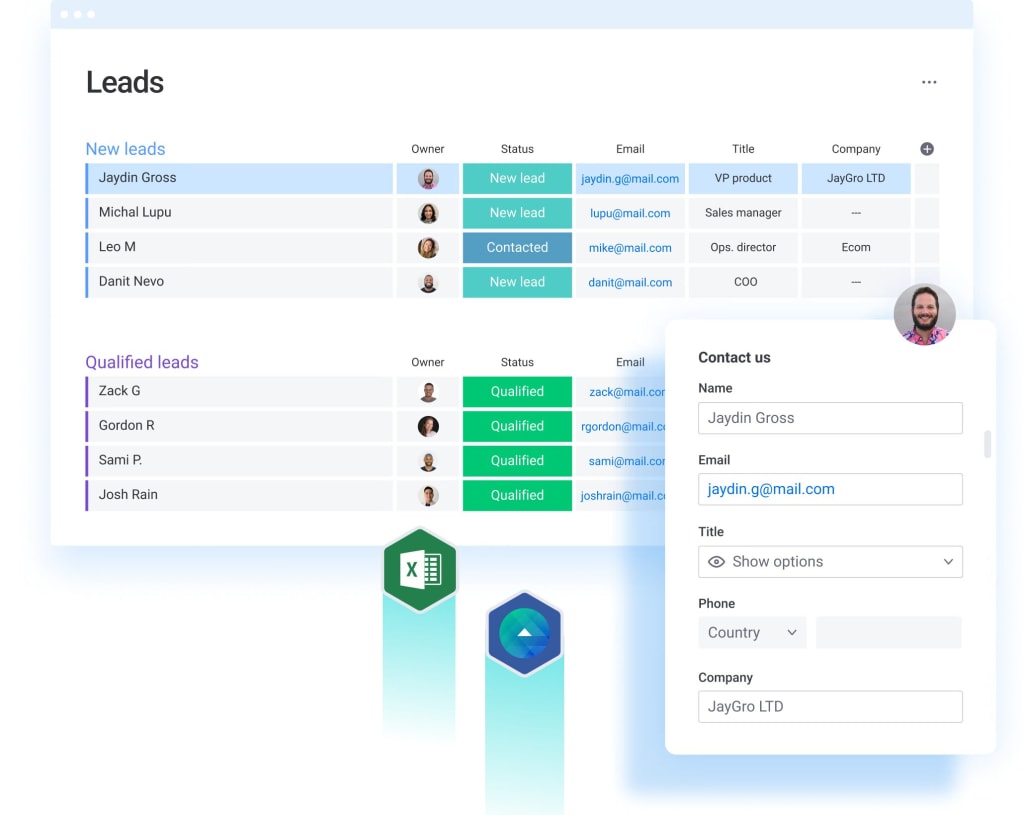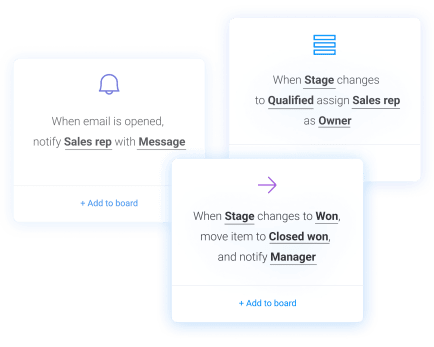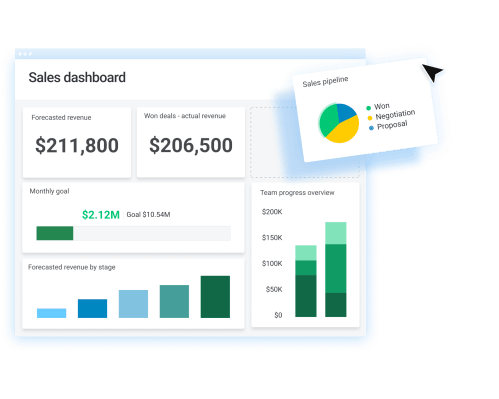You can’t build an effective marketing strategy without understanding who buys from you, where they come from, and what makes them hit that Buy button.
Enter lead analytics: the art and science of getting to know your leads better.
In this article, we’ll break down why you should analyze your leads, how to do it the right way, and some best practice tips from the experts. We’ll also show you how to use monday sales CRM to seamlessly manage and analyze your leads.
Try monday sales CRMWhat is lead analytics?
Lead analytics is the process of studying your leads to understand their behavior and optimize your conversion pipeline. When you’re analyzing your leads, you’ll want to examine information like:
- How they found your business (lead attribution)
- Demographic and behavioral information (lead segmentation)
- Which leads are most likely to become customers (lead scoring)
- Which actions increase the number of qualified leads (marketing strategy)
Why do you need to analyze your leads? 5 major benefits

Too many Marketing teams focus too heavily on generating new leads and don’t spend enough time analyzing those leads to understand what worked and what didn’t.
By analyzing your leads on a regular basis, you can significantly improve the effectiveness of your top-of-funnel marketing efforts.
Lead analytics has many major benefits, including:
1. Optimizing your marketing spend
If you understand which channels are generating leads, you’ll know where you should be spending your marketing budget. You’ll also be able to spot channels that aren’t delivering a return on investment, so you can take prompt action to save yourselves time and money.
2. Improving conversion rates
Tracking and analyzing lead behavior will also help you identify opportunities to boost lead conversions. You can compare strategies, understand the customer journey, and identify leaks in your existing pipeline (bottlenecks where you’re losing a large number of potential customers).
3. Using segmentation to personalize your marketing content
When you analyze your leads, you’ll be better able to understand the different types of people that buy from you. You can then group these profiles into segments, and use that information to create personalized marketing content that specifically addresses their interests and pain points.
4. Rating and prioritizing your leads
By analyzing leads, you’ll be able to spot trends and patterns in the data. One of the most useful questions to answer is: Which leads are most likely to become customers? Then, you can assign a rating to each lead based on this data, in a process called lead scoring.
5. Increasing your speed of response
Once you’ve set up your lead scoring rules, you’ll be able to follow up much more quickly with leads that have a high likelihood of becoming a customer.
Leonie Van Aswegen, the Marketing Manager at Rocketseed, explains that the speed of response is a crucial factor for competing in a competitive industry. “With lead scoring automatically applied to inbound lead notifications, our sales team has successfully secured an advantage over our competitors simply by prioritizing, responding immediately, and being prepared to engage with the prospect based on the information provided in their lead form.”
Pro tip: monday sales CRM makes it easy to manage and organize your leads with visual and intuitive lead tracking boards, so you can stay ahead of the competition.
Try monday sales CRMWhat are important lead analytic metrics to track?

When you’re getting started with lead analytics, it’s key to remember that not all metrics are useful, says Diana Stepanova, the Operations Director at Monitask, a B2B SaaS startup company.
For instance, so-called vanity metrics like website traffic or ad impressions don’t tell you whether or not those leads actually convert into customers, says Stepanova. Instead, “businesses should focus on more meaningful data.”
Harry Boxhall, an SEO consultant, agrees. By tracking KPIs instead of vanity metrics, Boxhall says that you can “pinpoint areas for improvement and adjust your strategies accordingly.”
Here are the top lead analytics metrics, according to our expert sources:
- Lead conversion rates: (Total number of conversions / Total number of leads) x 100
- Lead sources: Which channel the lead came from e.g. social media, webinars etc.)
- Time to convert: How long it takes your company to convert a lead into a prospect
- Customer lifetime value: How much each customer is worth
- Lead progress: Where each lead is in your sales pipeline
- Lead score: How likely each lead is to convert
- Number of interactions: How many interactions each lead has with your company
And, with monday sales CRM, you can keep all this information in the same place.
Try monday sales CRMBest practice tips for tracking leads analytics
Here are a few tips from marketing experts on how to get leads analytics right:
1. Review weekly
Joe Kevens, the Director of Demand Generation at PartnerStack and the Founder of B2B SaaS Reviews, warns that too many businesses focus on quarterly or monthly leads analytics. He recommends a weekly review instead.
“When we zoom out to monthly or quarterly views, it becomes harder to spot the increase, which makes it harder to know what’s working and what isn’t.”
2. Focus on segmentation
Harry Boxhall emphasizes that taking a one-size-fits-all approach when you’re analyzing your leads means missing out on a lot of information.
“Not all leads are equal, and it’s crucial to segment them based on their value, behavior, or other relevant factors. This allows for a tailored approach that can yield better results.”
Here are a few ways to segment your leads:
- Demographic: nationality, age, gender, ethnicity, etc.
- Psychographic: virtues, attitudes, values, interests, dislikes etc.
- Geographic: language, location, city, etc.
- Professional: income status, education level, employment status, profession, etc.
- Number of website visits: which pages, how long for, activity on these pages, regularity etc.
- Lead source: social media, email campaigns, organic traffic, affiliates, free downloads, free trials, lead form, etc.
- Content: engagement in particular topics, content pieces, blogs, etc.
Monday sales CRM makes it easy to segment your leads into different columns, so you can automatically group together leads based on characteristics of your choosing. You have the ability to add as many columns as you want to each board, meaning your options for lead segmentation categories are endless.
Try monday sales CRM3. Stress quality over quantity
Ryan Scollon, a Search Marketing Specialist, reminds businesses to prioritize the quality of the leads coming in over the quantity.
Many marketers consider a campaign a success if it creates an uptick in the number of overall leads, but if those leads aren’t likely to actually buy your products then they have no real business value.“Tracking the quality of your leads allows you to see the real ROI on your campaigns. Since implementing lead analytics into our marketing services, we’ve seen an average increase of 28% in qualified leads.”
4. Think strategically about lead attribution
Zeeshan Akhtar, the Head of Marketing at Mailmodo, an email marketing platform, warns marketers that effective lead analytics requires a bit of upfront planning on how you’re going to handle lead attribution.
“Many businesses assume that lead analytics can be done simply by attributing it to first touch or last touch. This downplays the contribution of the channels in the middle of these two landmarks, which might lead to shutting an effective channel erroneously.”
The solution to the issue is often to create a holistic picture of lead attribution by combining multiple data sources. For instance, you might want to gather information on where your leads first encountered your business (first-touch attribution), where they were immediately before making a purchase (last-touch attribution), and also asking them to complete a quick form (E.g. “How did you hear about us?”) when they purchase (zero-party attribution data).
How to effectively manage and analyze your leads with monday sales CRM
Leads analytics can sound complicated, but monday sales CRM is a valuable tool that makes it easy. Using monday sales CRM, you can:
- Capture all your leads, whether they connected with you through a form on your website, through your Facebook page, or from other sources
- Add no-code automations to save your team time and effort, such as automatically forwarding qualified leads to your sales reps

- Segment and score your leads based on customizable criteria
- View your entire communication history with each lead

- Log every meeting, call and email in the same place, so nothing gets lost
- Use dashboards to visualize your sales pipeline in real-time, with whatever view type works best for you, whether that’s a pie chart or a bar graph

FAQs
1. What is lead analytics?
Lead analytics is the process of analyzing your leads to understand:
- Who they are
- How they found your business
- How your marketing efforts are impacting demand
- Which types of leads are most likely to buy from you
2. Why is lead analytics important?
Lead analytics is extremely important for business success. When you analyze your leads, you can learn:
- Which marketing channels and types of content are most effective
- How well your marketing efforts are resonating with your target market
- Which market segments you should focus on
- How to increase the number of leads
- How to increase your conversion rates
3. How can analytics help with lead generation?
Lead analytics can help you better understand your leads and why they’ve connected with your business. With this information, you can create more personalized content, choose the right channels, and better position your products to generate more high-quality leads in the future.
Use lead analytics to gain actionable insights that will lead your team to success
With monday sales CRM, your team can gather all your lead information in one place and conduct advanced data analytics. Our customizable dashboards and easy-to-use lead capture and lead management tools make it easy to understand the most effective actions your Sales and Marketing teams can take to increase business revenue.

